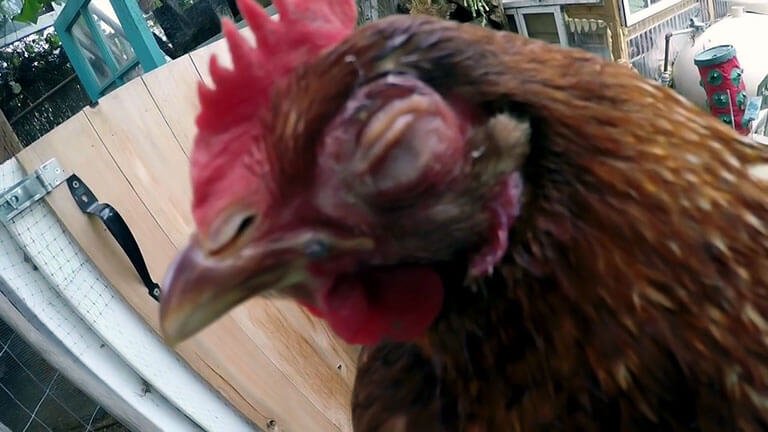Eye Problems With Chickens: Signs, Solutions, and Prevention
Chickens can face various eye problems, including conjunctivitis, pecking injuries, and cataracts. Early detection and treatment are crucial to prevent serious health issues.
Chickens are susceptible to a range of eye problems that can affect their health and well-being. Common issues include infections, injuries from pecking, or conditions like cataracts. These problems can lead to reduced vision, affecting their ability to forage and avoid predators.
Symptoms may include squinting, tearing, or swelling around the eyes. Proper eye care and management are essential for maintaining a healthy flock. Regularly inspect your chickens’ eyes and seek veterinary advice if any abnormalities arise. Understanding these issues will help you provide better care and ensure your chickens thrive in a safe environment.
Spotting Eye Problems In Chickens

Identifying eye problems in chickens is essential for their health. Early detection can prevent serious issues. This guide helps you recognize symptoms and assess their severity.
Common Symptoms
- Redness: Look for red or swollen eyes.
- Cloudiness: Eyes may appear cloudy or hazy.
- Discharge: Watch for watery or crusty discharge.
- Squinting: Chickens might squint or keep eyes closed.
- Avoiding Light: They may avoid bright areas.
- Behavior Changes: Signs include decreased activity or social withdrawal.
Assessing Severity
Evaluate the symptoms to determine the severity of the issue. Use this simple guide:
| Symptom | Severity Level | Action Required |
|---|---|---|
| Redness | Mild | Monitor closely |
| Cloudiness | Moderate | Consult a vet |
| Discharge | Severe | Immediate vet visit |
| Squinting | Moderate | Check for injuries |
| Avoiding Light | Mild | Keep in a calm area |
Use this guide to take timely action. Healthy eyes mean happy chickens. Regular checks will keep your flock thriving.
Common Eye Ailments
Chickens can suffer from various eye problems. These issues can affect their health and behavior. Understanding common eye ailments helps in early detection and treatment.
Infections And Treatments
Eye infections in chickens are frequent. Bacterial or viral infections often cause them. Symptoms include:
- Redness in the eye
- Swelling around the eye
- Discharge from the eye
Common types of infections include:
| Infection Type | Symptoms | Treatment |
|---|---|---|
| Conjunctivitis | Redness, swelling, discharge | Antibiotic eye drops |
| IB (Infectious Bronchitis) | Swelling, watery eyes | Vaccination, supportive care |
| Mycoplasma | Cloudy eyes, discharge | Antibiotics, isolation |
Prompt treatment is crucial. Consult a veterinarian for proper diagnosis.
Injury-related Issues
Chickens can also injure their eyes. Scratches or pecking can lead to problems. Signs of injury include:
- Squinting or closing one eye
- Visible scratches or swelling
- Behavioral changes, like isolation
To treat eye injuries:
- Isolate the affected chicken.
- Clean the eye gently with saline.
- Apply antibiotic ointment if needed.
- Monitor for signs of improvement.
Seek veterinary help for severe injuries. Early intervention can prevent serious damage.
Infectious Diseases Affecting Eyesight
Chickens can suffer from various infectious diseases that impact their eyesight. These diseases can cause significant health issues. Understanding these conditions helps in early detection and treatment.
Marek’s Disease Insights
Marek’s Disease is a viral illness caused by the Marek’s disease virus (MDV). It primarily affects young chickens.
- Symptoms include:
- Vision problems
- Pupil constriction
- Gray eye appearance
This disease can lead to blindness. It spreads easily among birds. Vaccination is crucial for prevention. Regular biosecurity measures also help limit its spread.
Fowl Pox Implications
Fowl Pox is another disease that can affect chickens’ eyes. It is caused by a virus. The disease can manifest in two forms:
| Form | Symptoms |
|---|---|
| Cutaneous | Wart-like lesions on skin |
| Systemic | Lesions in the mouth and eyes |
Eye lesions can lead to:
- Swelling
- Discharge
- Blindness
Vaccination is effective against Fowl Pox. Isolate infected birds to prevent outbreaks.
Non-infectious Causes
Chickens can face various eye problems. Some issues arise from non-infectious causes. These can stem from nutritional deficiencies or genetic factors. Understanding these causes helps in managing chicken health effectively.
Nutritional Deficiencies
Nutritional deficiencies are a major cause of eye problems in chickens. A lack of essential vitamins and minerals can affect their vision. Common deficiencies include:
- Vitamin A: Essential for maintaining healthy eyesight.
- Vitamin E: Supports overall eye health and function.
- Calcium: Important for strong bones and eye structure.
Signs of nutritional deficiencies may include:
- Cloudy eyes
- Squinting or blinking excessively
- Difficulty in seeing
Providing a balanced diet is crucial. Consider using high-quality feed and supplements to prevent these issues.
Genetic Factors
Genetic factors also contribute to eye problems in chickens. Some breeds are more prone to specific eye conditions. Common genetic issues include:
| Genetic Condition | Description |
|---|---|
| Retinal Degeneration | Progressive loss of vision due to retinal damage. |
| Congenital Eye Defects | Abnormalities present at birth affecting vision. |
Choosing healthy breeding stock helps reduce these genetic problems. Regular health checks can identify issues early.
Diagnosis Of Ocular Conditions
Diagnosing eye problems in chickens is crucial. Early detection leads to better outcomes. Regular monitoring helps identify issues quickly. Understanding veterinary procedures and at-home checks is essential.
Veterinary Procedures
Veterinary procedures for diagnosing ocular conditions in chickens include:
- Physical Examination: A vet examines the eyes for signs of disease.
- Fluorescein Staining: This test checks for corneal ulcers.
- Ophthalmoscopy: A device helps see inside the eye.
- Culture Tests: Samples taken to identify infections.
- Blood Tests: To rule out systemic diseases affecting the eyes.
Each of these tests provides valuable information. They help identify the cause of the eye issue. Quick diagnosis is key to effective treatment.
At-home Monitoring
At-home monitoring can help detect ocular problems early. Here are some signs to watch for:
- Discharge: Any abnormal discharge from the eyes.
- Cloudiness: Look for cloudy or opaque areas on the eyes.
- Redness: Check for redness around the eye or eyelids.
- Squinting: Observe if the chicken is squinting or keeping its eyes closed.
- Behavior Changes: Note any changes in behavior or activity level.
Keep a close eye on your chickens. Early detection can lead to prompt veterinary care. This approach can save your chickens from serious issues.
Treatment Strategies
Effective treatment strategies are essential for addressing eye problems in chickens. These strategies include various medication options and natural remedies. Each approach helps restore the chickens’ vision and overall health.
Medication Options
Medications can effectively treat various eye issues in chickens. Here are some common options:
| Medication | Uses | Dosage |
|---|---|---|
| Antibiotics | Treat bacterial infections | Follow vet’s advice |
| Anti-inflammatory drugs | Reduce swelling | Follow vet’s advice |
| Eye ointments | Soothing eye irritation | Follow vet’s advice |
Always consult a veterinarian before starting any medication. Proper dosing is crucial for effective treatment.
Natural Remedies
Natural remedies can provide gentle treatment options for chicken eye problems. Here are some effective remedies:
- Warm compresses: Apply warm cloths to soothe irritation.
- Apple cider vinegar: Dilute with water and use as eye rinse.
- Chamomile tea: Brew and cool, then use as an eye wash.
- Garlic: Mix crushed garlic in water for antibacterial properties.
Natural remedies can support healing without harsh chemicals. Monitor your chickens closely during treatment.
Recovery And Aftercare
After treating eye problems in chickens, proper recovery and aftercare are essential. Good care helps prevent further issues and ensures a smooth recovery.
Post-treatment Care
After treatment, focus on the following care steps:
- Isolation: Keep affected chickens away from the flock.
- Comfortable Environment: Provide a clean, dry, and quiet space.
- Nutrition: Offer high-quality food rich in vitamins.
- Hydration: Ensure fresh, clean water is always available.
- Observation: Watch for any signs of distress or pain.
Use a soft cloth to gently clean any discharge from the eyes. This helps prevent infections and keeps the area clean.
Monitoring For Recurrence
Keep an eye on the chicken’s condition after treatment. Regular monitoring can catch issues early.
- Check eyes daily for redness or swelling.
- Look for changes in behavior or appetite.
- Note any signs of discharge or crusting.
- Monitor overall health, including weight and activity level.
Document any changes. This information helps the vet if problems return.
| Signs to Watch For | Action |
|---|---|
| Redness or swelling | Contact a vet immediately |
| Discharge or crusting | Clean the area and monitor |
| Loss of appetite | Provide favorite treats |
| Unusual behavior | Assess for pain or stress |
Proper recovery and aftercare lead to a healthier flock. Stay vigilant for signs of trouble.
Prevention Tactics
Preventing eye problems in chickens is vital for their health. Good management practices can keep their eyes clear and healthy. Focus on diet, nutrition, and environmental factors for effective prevention.
Diet And Nutrition
A balanced diet is essential for your chickens’ eye health. Nutrients play a crucial role in maintaining clear vision. Here are some important dietary components:
- Vitamin A: Supports vision and eye health.
- Omega-3 Fatty Acids: Reduces inflammation and promotes healthy eyes.
- Antioxidants: Protects against cellular damage.
Provide a variety of foods to ensure proper nutrition:
| Food Type | Benefits |
|---|---|
| Leafy Greens | Rich in vitamins and minerals. |
| Seeds and Nuts | Source of healthy fats. |
| Grains | Provides energy and fiber. |
Ensure fresh, clean water is available. Hydration helps overall health, including eyes.
Environmental Management
A clean and safe environment prevents eye issues. Follow these tips for better management:
- Maintain clean coops and run areas.
- Remove debris and waste regularly.
- Ensure good ventilation to reduce dust.
Consider these factors in your coop design:
- Provide shaded areas to protect from sunlight.
- Use smooth, non-abrasive materials.
- Limit exposure to harmful chemicals.
Regular health checks help catch problems early. Monitor your chickens for signs of eye issues.
Future Insights
Understanding eye problems in chickens is crucial for their health. Future insights promise better solutions for poultry farmers. Research and technology advancements improve chicken care significantly.
Research Developments
Recent studies focus on eye diseases affecting chickens. Researchers explore various conditions, such as:
- Conjunctivitis – Inflammation of the eye membrane.
- Cataracts – Clouding of the eye lens.
- Corneal Ulcers – Open sores on the eye surface.
Scientists work on identifying genetic factors. They study how genetics influence eye health. New diagnostic tools help in early detection.
Developments in vaccines show promise. Vaccines may prevent some eye diseases. This can lead to healthier flocks and better production rates.
Advancements In Poultry Care
Technology plays a big role in poultry care. New tools help farmers monitor chicken health effectively. Some advancements include:
| Technology | Benefit |
|---|---|
| Wearable Sensors | Track health metrics in real-time. |
| Automated Lighting | Enhance vision and reduce stress. |
| Telemedicine | Access veterinary care remotely. |
Farmers now use apps to monitor flocks. These apps provide alerts for any health issues. Early intervention can save many chickens.
Education on eye health is vital. Training programs help farmers recognize symptoms early. Better knowledge leads to improved flock management.
Frequently Asked Questions
What Are Common Eye Problems In Chickens?
Chickens often suffer from cataracts, conjunctivitis, and pecking injuries, affecting their vision and health.
How To Identify Eye Issues In Chickens?
Look for signs like squinting, redness, excessive tearing, or abnormal behavior to spot eye problems early.
Can Eye Problems Affect Chicken Behavior?
Yes, vision impairment can lead to increased aggression, reduced foraging, and social withdrawal among chickens.
What Causes Eye Infections In Chickens?
Bacterial, viral infections, or environmental factors like dust and ammonia can lead to eye infections in chickens.
How To Treat Eye Problems In Chickens?
Treatment varies; clean the eye, use antibiotics, or consult a vet for severe cases to ensure proper care.
Conclusion
Eye problems in chickens can lead to serious health issues if not addressed promptly. Regular monitoring of your flock’s eye health is essential. Early detection and proper care can prevent complications. Always consult a veterinarian when you notice unusual symptoms.
Healthy eyes contribute to a thriving and productive chicken population.






